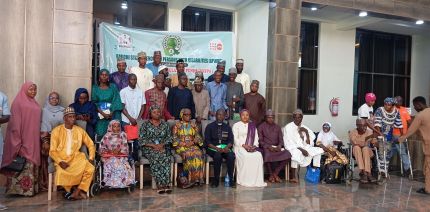Bauchi State has taken the lead in promoting disability inclusion in Northern Nigeria with the inauguration of the first-ever Disability Inclusion Technical Working Group (DITWG).
The initiative, launched on Monday in collaboration with the United Nations Population Fund (UNFPA), makes Bauchi the first among the 19 northern states to establish such a platform.
Speaking at the event, Executive Secretary of the Bauchi State Agency for Persons with Disability, Mrs. Brisca Jerome Aaron, described the group as a strategic platform to harmonize efforts toward ensuring that no person with a disability is left behind in the state’s development agenda.
She explained that the 36-member Technical Working Group draws representatives from key government ministries, agencies, and disability advocates. According to her, the group will serve as a mechanism to strengthen policies, programmes, and awareness initiatives across the state.
“The present administration in the state has provided an enabling environment for Persons with Disabilities (PWDs), including the establishment of the Agency and various empowerment programmes,” Aaron said.
“The support from UNFPA in forming this Disability Technical Working Group will go a long way in complementing government efforts to promote inclusive development and governance.”
She added that the group will identify responsibilities, consolidate and coordinate stakeholder activities, and support initiatives that address the needs of PWDs in Bauchi State.
“Bauchi being the first to inaugurate such a committee will serve as a reference point for other northern states—it is a promise,” she said.
Representing the UNFPA Representative in Nigeria, Ms. Muriel Mafico, the agency’s Disability and Diversity Inclusion Analyst, Olawunmi Akande, said the inauguration marks a significant milestone in advancing inclusion, equity, and human rights for all persons with disabilities in Nigeria.
“This demonstrates our collective resolve to ensure that no one is left behind—especially PWDs who often face barriers to participation, access, and opportunities,” Akande said.
She noted that UNFPA considers disability inclusion central to achieving the Sustainable Development Goals (SDGs) and the promise of the 2030 Agenda.
“UNFPA stands ready to support the TWG through evidence generation, capacity building, inclusive programming, and technical assistance,” Mafico added.
“We are committed to ensuring that persons with disabilities—especially women, girls, and young people—have equal access to sexual and reproductive health services, education, and opportunities to participate meaningfully in decision-making.”
UNFPA Gender and Reproductive Health Analyst, Debora Tabara, reaffirmed the organization’s continued partnership with the Bauchi State Government to drive sustainable and inclusive development.
Also speaking, Mr. Abubakar Sambo of the Bauchi State Agency for Disabled Persons highlighted the multi-sectoral nature of the initiative. He said the DITWG is designed to foster coordination and collaboration among stakeholders and Organizations of Persons with Disabilities (OPDs) in the state.
According to him, the group will provide technical support across key areas such as:
- Inclusive education
- Accessible infrastructure
- Disability-inclusive employment practices
- Health service delivery
He added that the Working Group will also engage in policy review and advocacy to ensure that existing frameworks align with international standards and best practice


